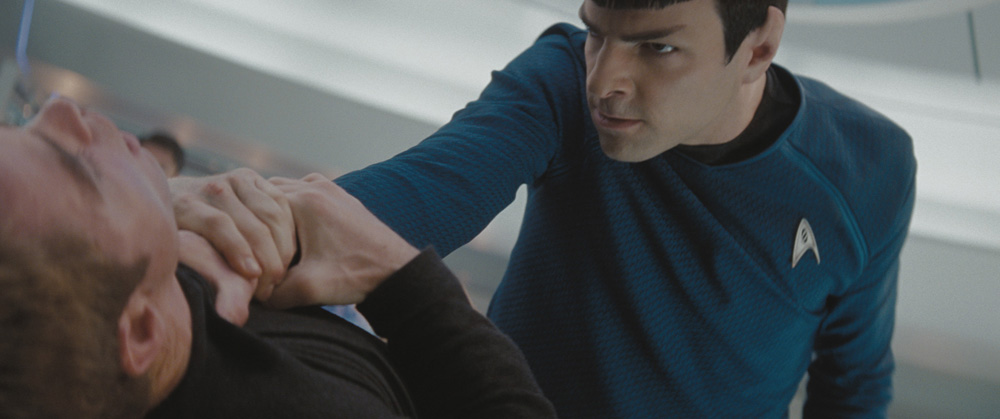
It’s beginning to look like the Star Trek and Terminator movies could have a couple of very significant things in common – and no, I’m not just referring to their ILM special effects or to their sometimes overlapping cast members. (Anton Yelchin plays Kyle Reese and Pavel Chekov in the upcoming Terminator and Star Trek movies, respectively; Paul Winfield played the ill-fated Captain Terrell in Star Trek II: The Wrath of Khan two years before he played the ill-fated Lieutenant Ed Traxler in the original Terminator.)
The newest trailer for Terminator Salvation went online today, and reports coming out of WonderCon 2009 indicate that a new trailer for Star Trek was shown to the masses there, too, and should be arriving in theatres in the very near future. And based on these trailers – or, in Star Trek‘s case, the description of that trailer provided by ComingSoon.net and TrekMovie.com – it sounds like each of these franchises is pushing in a direction that may be new to the franchise in question, but has already been well-covered by the other one.
Warning: There may be spoilers ahead, but they are all gleaned from the trailers that have already been made public (and, in Star Trek‘s case, some of these details are also gleaned from the Countdown prequel comic-book mini-series that is already out there).
Let’s start with the plot element that Star Trek seems to be borrowing from The Terminator, namely time-travel and attempted retroactive abortion.
As we all know, the original Terminator was about a robot that came back in time to kill Sarah Connor before she could give birth to the future saviour of humanity – and in the first two sequels, the arrival of even more robotic assassins from the future wreaked havoc with the timeline, such that Sarah’s son John can now be heard saying, in the trailers for Terminator Salvation, that the future he is living in is no longer the future his mother warned him about.
The new Star Trek movie, meanwhile, begins in the late 24th century and, if what I have heard is correct, concerns a Romulan who goes back in time to the mid-23rd century to kill the parents of James T. Kirk before the man himself can be born – but while the Romulan villain does succeed in killing Kirk’s father (a detail that is reportedly acknowledged in the new trailer), Kirk himself will still grow up to become a starship captain, even if he gets there by a different route.
And just as Kyle Reese and a couple of reprogrammed Terminators came back in time to protect Sarah Connor and her son in the first three Terminator movies, so too it seems that the elderly Spock, played by Leonard Nimoy himself, will come back in time to help the young Kirk in the new Star Trek movie.
The key difference between the two series, in this regard, seems to be that there are many universes and many timelines co-existing in the world of Star Trek, whereas there seems to be only one universe in the Terminator movies, and essentially only one timeline, even if it sometimes rewrites itself. The crew of the Enterprise-Donce encountered many Enterprises from many different universes, but you never get the sense that the John Connor who lives in the timeline where Judgment Day took place in 1997 could ever visit the John Connor who lives in the timeline where Judgment Day took place in 2004, for example.
And then there is the plot element that Terminator Salvation seems to be borrowing from Star Trek and countless other science-fiction stories, namely its increasingly complicated view of human-robot relationships. You can get a sense of that element from the trailer that went online today:
Click here if the video file above doesn’t play properly.
The original Star Trek series (1966-1969) frequently made the point that computers and robots were inferior to human beings and should never be given the privileges, esteem or authority that are given to human beings. But Gene Roddenberry’s attitude towards such things began to soften in the 1970s, as he produced TV pilots like The Questor Tapes (1974) and movies like Star Trek: The Motion Picture (1979), both of which were essentially sympathetic portrayals of machines that go searching for their creators. Finally, Roddenberry made the android Data one of the regular members of Star Trek: The Next Generation (1987-1994), even going so far as to devote an early episode to the proposition that Data constitutes a form of “new life” that is entitled to what we used to call “human rights”.
A similar evolution in sensibility seems to be taking place across the Terminator movies as well. In the first film, the machines were all evil, period, especially the one played by Arnold Schwarzenegger. The second and third films introduced copies of the Schwarzenegger cyborg that were re-programmed to fight for the good guys instead of the bad guys – but while both of these robots were capable of some character growth, they were still more machine than man, and their identification as “good guys” ultimately rested on the fact that someone had fiddled with their software.
Now, however, Terminator Salvation seems poised to go one step further, by introducing a character who sincerely believes himself to be human and is shocked to discover that he has a robotic endoskeleton just like all the Terminators. What is more, the new trailer seems to suggest that this character will become essential to humanity’s survival in some way. He is not a mechanical slave compelled to take orders from the person who re-programmed him; instead, he seems more like an ally.
How, exactly, this character came to believe he was human has not yet been explained – but on the surface, at least, it seems that the Connors, who once regarded the machines as their bitter enemies, and then found a way to bend some of the machines to their will, must now become partners with a machine who is apparently siding with them of his own free will. And no doubt the movie will raise the question of what makes this new character so different from the rest of us anyway.
So, interesting times ahead.
In the meantime, a few more tidbits about Terminator Salvation came out of WonderCon. In brief:
Hitfix and ComingSoon.net report that whether the film is rated R (like the first three films) or PG-13 may depend on whether the film includes a nude scene that is designed to show what makes flesh-and-blood humans different from the machines.
Hitfix also reports that director McG is still talking to original Terminator co-stars Arnold Schwarzenegger and Linda Hamilton about finding some way to fit them into the new movie. He adds: “If the first movie’s about saving Sarah Connor and the second movie’s about saving John Connor, our movie’s about saving Kyle Reese.”
Finally, Ain’t It Cool News reports that McG told the crowd at WonderCon that “Skynet is gathering all these people in order to rip their stem cells out of them, using that as their main study for replicating human tissue.” One can only wonder how that might play into current medical-ethics debates.









